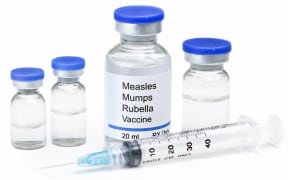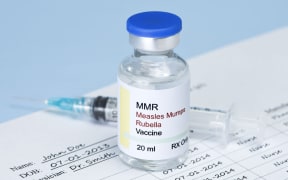A Canterbury doctor helping tackle the region's measles outbreak warns up to 100,000 people must be vaccinated.

As of late yesterday afternoon Canterbury District Health Board had 25 confirmed cases of the highly infectious disease. Photo: 123RF
As of late yesterday afternoon Canterbury District Health Board had 25 confirmed cases of the highly infectious disease.
It's warned that figure was likely to rise over the coming days and weeks.
"It can now be assumed that measles is circulating widely in our community."
With vaccine supplies dried up, an additional 18,000 doses are expected to be available in practices from Wednesday.
GP at Richmond Health, Dr Phil Schroeder, is co-ordinating the community approach under the Canterbury Primary Response Group.
He said Canterbury faced an immense vaccination programme if it was to get on top of the outbreak.
"Unfortunately, it's an unprecedented vaccination programme for Canterbury that is being entertained here, and probably represents a good quarter of the population, which is no mean feat.
"We're talking across the whole region something in the vicinity of 100,000 or thereabouts.
"We need 5000 vaccines to be given every working day of the next six weeks to be able to accomplish this, so we really do need good vaccine supply and we need it to be consistently good."
He told Morning Report the measles is the most highly contagious of all viruses known to mankind.
"It's not something to be ignored and unfortuntately it has quite a high morbidity ility rate in that probably one in ten people who get measles may end up requiring hospital care."
He said normally with measles outbreaks childhood vaccinations need to be increased but a third of the current cases are in the 29-50 age group.
These people have already received a vaccination but it was slightly less effective that the current MMR vaccination, he said.
"We realise we're in a bit of a different case to most measles outbreaks in New Zealand in the past."
Dr Schroeder said colleagues were working frantically and phones were ringing non-stop with people wanting the vaccine as soon as possible.
"We're expecting this to take about six weeks to deliver so it's not a short term thing, it's a long term thing. Initially, our phones in our practices have been going absolutely mad, particularly on Thursday and Friday of last week when folk were ringing in to book in to get immunised, and we didn't have any vaccine to give.
"All vaccine supplies we had were exhausted pretty quickly and that remains the main problem for us right now."
He hoped today's re-supply would be the start of a steady stream of vaccines, and said he had had assurances from the authorities that it would continue.
"We hope to see the fruition of that. We can't afford to be booking vaccination clinics without it really."
Dr Schroeder said it was important people were patient, with priority being given to certain groups to try to minimise the impact and contain the outbreak.
GPs have been asked to prioritise people not up-to-date for their age group, specifically those aged five to 28 who are either not immunised or who have had only one MMR dose.
That also included children 12 months to five years who have never received any MMR.
Adults aged 29 to 50 were another priority group, as they would have only received one dose of measles vaccine.
"This is actually a long-term thing. A lot of patients had been ringing earlier thinking they'd get seen today and vaccinated today. That's plainly not going to happen. What practices are doing is recalling patients as they have capacity to vaccinate with a mind to those priority groups.
"It's very hard for patients sometimes to understand where they fit in terms of the need to be vaccinated, so we accept that and I think folk just need to have confidence that their general practice has got their best interests in mind in terms of when and where they'll be vaccinating.
"It is a long process and patience is going to be a virtue right across the field."
Dr Schroeder said it was important patients phoned ahead as clinics did not want them in the waiting rooms for fear of spreading the disease.
"There are all sorts of novel ways that practices come up with being able to assess patients, most often we will actually try to do an initial assessment in people's cars rather than bring them into the facility which then requires quite a lot of cleaning and infection control."
Prime Minister Jacinda Ardern is urging the public to ensure they are fully immunised against measles.
She said people everywhere should ensure they are up to date with their immunisations, including for measles.
"This is just another strong message - people cannot reply on others being immunised to protect them, we need to keep encouraging people to take up immunisation."
Measles facts:
- Measles is a highly infectious viral illness spread by contact with respiratory secretions through coughing and sneezing.
- People are infectious from five days before the onset of the rash to five days after the rash starts.
- Infected persons should stay in isolation - staying home from school or work - during this time.
- The best protection from measles is to have two MMR vaccinations. MMR is available from your family practice and is free to eligible persons.
- People are considered immune if they have received two doses of MMR vaccine, have had a measles illness previously, or were born before 1969.
- Anyone believing they have been exposed to measles or exhibiting symptoms, should not go to the ED or after hours' clinic or general practitioner. Instead, call the GP first.
'People are scared to give their children vaccinations'
Major outbreaks of measles have also hit the Philippines and the Ukraine.
In the Philippines there have been 261 deaths this year, mostly children, and about 16,000 cases have been reported.
Last year 54,000 cases were reported in Ukraine and so far this year there have been 21,000 cases and seven deaths.
Red Cross have deployed volunteers to help those countries contain the outbreak.
Corinne Ambler, from the Red Cross in Budapest, told Morning Report the situation was likely to be worse than that in those countries because not everyone reported their case.
Ms Ambler said the World Health Organization recommended 95 percent of a population be vaccinated to protect those who cannot have vaccinations - those with a compromised immune system, HIV and tuberculosis patients, and Chernobyl nuclear disaster survivors.
"In the Ukraine, I think there are about four million unvaccinated people and more than half of those are children," she said.
Just half of newborns in the Ukraine were immunised, making it one of the lowest rates in the world, she said.
"I was talking to a colleague in the Philippines this morning, and she said in some areas where they are going only 18 percent are vaccinated."
Some of the factors contributing to the low rates of vaccination was the lack of awareness on its importance, misinformation, remote areas further away from medical institutes, she said.
"But as we're seeing worldwide, the main reason is vaccine refusal. People are scared to give their children vaccinations, and this is despite the fact that we know that vaccines save hundreds of thousands of lives every year.
"Parents are scared, they believe some of the myths that have been propagated around, you know, the dangers of vaccines, which are not true - they've been proven to be not true."
Between 2000-2017, measles vaccination prevented an estimated 21.1 million deaths, according to WHO.
Red Cross volunteers in the Ukraine have been working the Ministry of Health to educate people on vaccinations and talk through parents' concerns. In Philippines, Red Cross volunteers have vaccinated 70,000 children, and set up measles units to help hospitals isolate infectious cases.
Measles is four times more infectious than the flu, and a patient can infect up to 18 other people. The virus can live in the air for hours after a person has been coughing and sneezing in the area.



